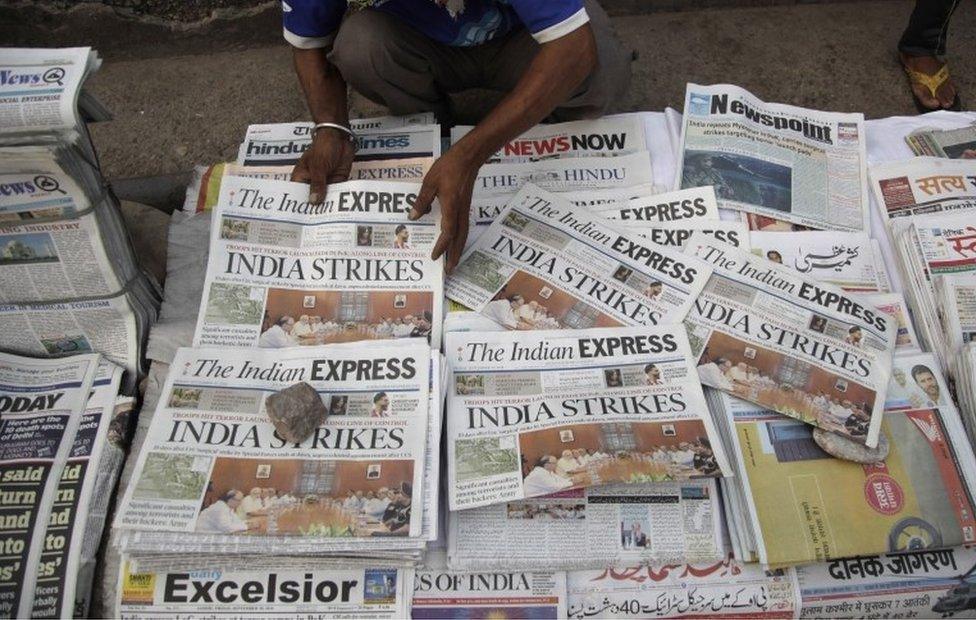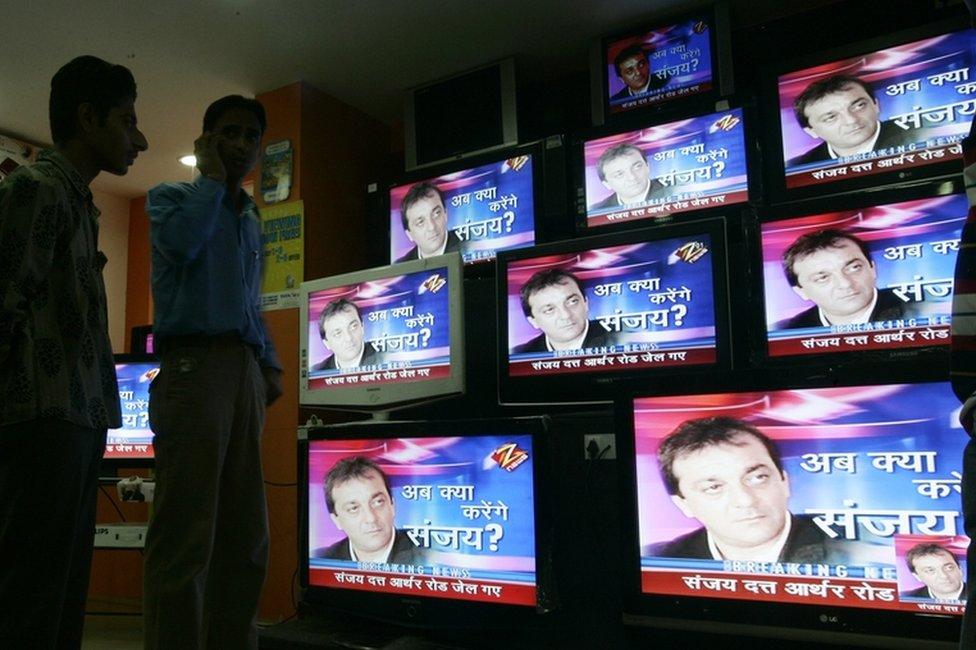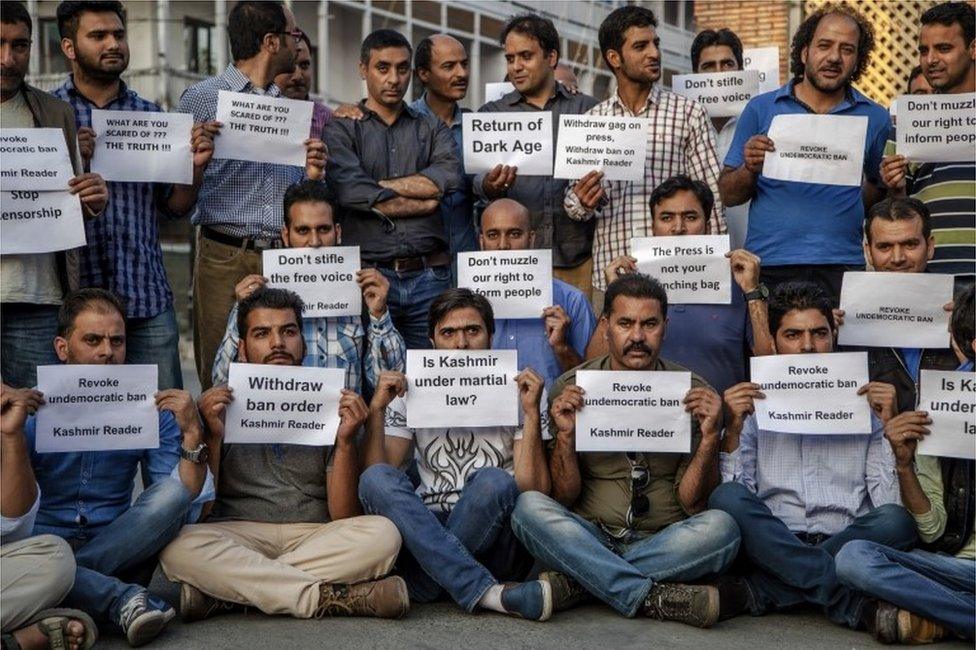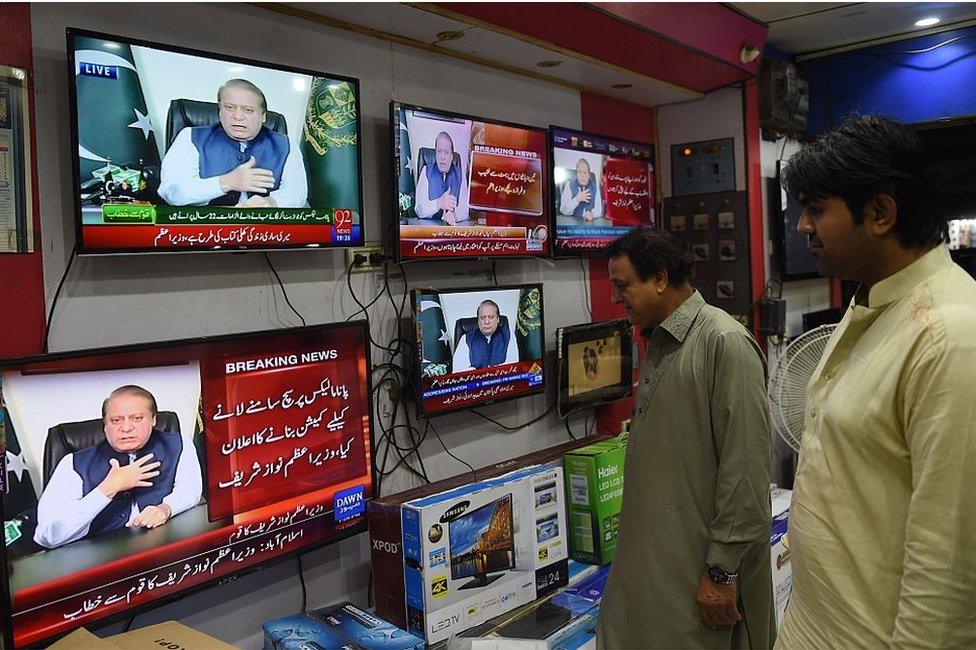Viewpoint: No winners in India-Pakistan debate on press freedom
- Published

India is placed at the bottom third of the World Press Freedom index
Indians and Pakistanis are having yet another rivalry debate: Whose media is freer, more independent? Shivam Vij explains why the discussion itself is ironic.
With Pakistan's Dawn newspaper standing by its story on differences between the civilian government and military , externalover the country's security objectives, many in both the Indian and Pakistani media have cited the incident as proof that the Pakistani media has more spine than its Indian counterparts.
Around the same time, India's most liberal news channel, NDTV, dropped an interview , externalof India's former Minister for Home Affairs, P Chidambaram, for reasons of "national security".
In a statement to online publication The Wire, external, the co-founder and chairman of NDTV Radhika Roy said, "Like all decisions we take at NDTV, we are driven by editorial and journalistic integrity and the belief that the political mud slinging regarding the surgical strikes without a shred of evidence was actually damaging to our national security."
Poor state
Pakistani journalists, too, have been suggesting they are braver, and are able to express dissent more freely than their Indian counterparts, who give in to the government line more easily.
It's a zero sum debate. One that only ends up betraying the poor state of press freedom in both countries.
India, which makes a lot of noise about being the world's largest democracy, was placed in the bottom third of the World Press Freedom Index 2016 published by Reporters Without Borders. Ranked 133, external of 180 countries, press freedom in India is only worsening, and Reporters Without Borders says the government is indifferent to the issue.

India has hundreds of news channels
Four journalists were murdered in India in 2015, and at least one is attacked every month. A draconian criminal defamation law imposes major constraints on journalists, and results in self-censorship.
"The range of such attacks is staggering," says Geeta Seshu, who tracks free speech for TheHoot.org, a media-watch website.
"There is a dominant narrative of national security, which results in the ban on the internet and newspapers in Kashmir, the rash of defamation to silence reportage of corporate fraud, the killings of journalists who chronicle corruption by local mafias, and the jailing and hounding of independent journalists in Chhattisgarh by security forces and vigilante groups," she says.
Restrictions
In the ongoing unrest in Indian-administered Kashmir, the government has placed several restrictions on press freedom.
Curfew passes have been denied, journalists have been attacked, external, newspaper circulation in the state was stopped for days, and one newspaper Kashmir Reader, has been banned altogether.
In any other part of the world, the banning of a newspaper would have raised a hue and cry, but the Indian media has largely chosen to ignore it.
Given Pakistan's fragile democracy and large-scale terrorism, it is not surprising that Pakistan scored even poorer in the press freedom index, coming in at 147. The ranking contradicts that the claim the Pakistani media is freer.
"Journalists are targeted by extremist groups, Islamist organisations and Pakistan's feared intelligence organisations, all of which are on RSF's list of predators of press freedom. Although at war with each other, they are all always ready to denounce acts of "sacrilege" by the media. Inevitably, self-censorship is widely practiced within news organisations," says the RSF's 2016 report, external.

Journalists have protested against the ban on Kashmir Reader
"When it comes to national security in Pakistan, there may be some space for dissent in English language newspapers. On news TV, however, any divergence from the establishment line is too risky. It is simply not allowed," says Pakistani journalist and commentator Raza Rumi, who lives in self-exile in the United States after surviving an assassination attempt in Lahore in 2014.
Mr Rumi hosted a TV show in which he differed from the country's foreign policy and raised issues of minority rights.
Reporting on human rights in Balochistan also resulted in an assassination attempt on prominent news anchor Hamid Mir in 2014. Mr Mir's brother immediately went on air and blamed the Pakistani military for the attack.
"On religious extremism, with issues such as the blasphemy law, television journalists fearing for their lives exercise self-censorship even when there is no official restriction. News of the persecution of the Ahmediya community barely makes it into mainstream news," says Rumi.
Physical attacks
Physical attacks and direct censorship are only a small part of the problem, a manifestation of the wider effort in both countries to control the media narrative.
The result is that in both countries, news that is critical of the government or military, is becoming increasingly an exception rather than the norm. The media is increasingly toeing the establishment line.
"No one knows anymore the difference between censorship and self-censorship, between truth and propaganda, between journalism and jingoism," wrote , externalManini Chatterjee in The Telegraph newspaper.
Also, India's Narendra Modi-led BJP government has reduced access to journalists and heightened PR so as to be able to better control the narrative.
In Pakistan, the pressure comes more from the military. Columnist Ayesha Siddiqa, a prominent critic of the country's security policies, finds her columns edited or rejected, external so often that she publishes more in India than in Pakistan.

Press freedom is under strain in Pakistan
"Today the ISPR [Inter-Services Public Relations] is a corps strength headed by a lieutenant general… The military PR agency today runs a large network of radio channels, has stakes in different television channels, finances films and theatre. This is not just a benign institutional expansion but is shaping up and controlling the national narrative," Ms Siddiqa writes in The News, external, a Pakistani daily.
Marred by rebel groups seeking secession from Pakistan, Balochistan is an information black hole, external that journalists don't even have independent access to.
In the debate over which country's media is freer, there is no winner. In both India and Pakistan, press freedom is under heavy strain.
Shivam Vij is a Delhi-based independent journalist